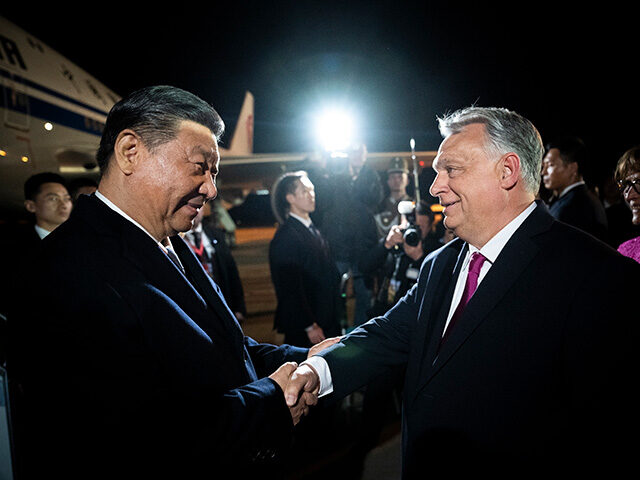Hungary rolled out the red carpet for Chinese dictator Xi Jinping on Thursday as he paid his first state visit to Budapest.
Xi is scheduled to meet with both President Tamas Sulyok and Prime Minister Viktor Orbán to sign more than a dozen trade deals, many of them linked to China’s Belt and Road Initiative (BRI).

Chinese President Xi Jinping meets with Hungarian Prime Minister Viktor Orban at the Great Hall of the People in Beijing, capital of China on October 17, 2023. (Rao Aimin/Xinhua via Getty Images)
Hungary was Xi’s last stop after an unusual five-day tour of Europe, his first visit to the continent in five years. As American influence collapses under President Joe Biden, Xi sees an opportunity to rally European states to a post-Western world order that counts Russia as a member in good standing despite its brutal invasion of Ukraine.
Hungary serves as the gateway for Chinese authoritarianism into Europe, as its government has few qualms about China’s human rights violations, just as Hungary has been reluctant to join European Union (EU) and North Atlantic Treaty Organization (NATO) sanctions against Russia for the invasion of Ukraine.
In his remarks from the red carpet, Xi praised China’s “everlasting friendship” with Hungary and said it would not be “restricted by a third party.”
President Xi Jinping attended the welcoming ceremony jointly held by President Tamás Sulyokand Prime Minister Viktor Orban. pic.twitter.com/lF9Nm4wBKV
— Hua Chunying 华春莹 (@SpokespersonCHN) May 9, 2024
— Hua Chunying 华春莹 (@SpokespersonCHN) May 9, 2024
“It is hoped that Hungary will take the opportunity of assuming the rotating EU presidency in the second half of this year to promote the stable and healthy development of China-EU relations,” Xi said.
President Sulyok responded that Hungary has “benefited a lot” from BRI, and would eagerly join three more Chinese-led global development initiatives. Sulyok said these programs would help to prevent “bloc confrontation,” adopting a derogatory phrase China developed to refer to the supposedly aggressive and unreasonable Western powers.
Hungarian Foreign Minister Peter Szijjarto hailed Xi’s visit as “historic” and said China has become Hungary’s largest foreign investor.
Hungary is Europe’s largest recipient of BRI funding. Hungary also hosts China’s biggest electric-vehicle battery plant on foreign soil and more Chinese companies are looking to build battery factories there.
RELATED VIDEO — Blinken: There’s Evidence China Is Trying to “Influence and Arguably Interfere” in Our Elections Despite Biden’s Warning:
China currently produces 79 percent of the world’s lithium-ion batteries on its soil, the United States produces six percent, and Hungary is up to four percent thanks to Chinese investment. China’s massive plants in Hungary were built over the strenuous objections of local residents who were forced to watch as their picturesque farmland was mercilessly bulldozed, the water table was polluted, and Chinese workers moved in to grab the best new jobs.
Not all Hungarians were happy that their government rolled out the red carpet for China’s genocidal dictator. Protesters gathered in Budapest before Xi’s arrival to protest the oppression of Tibet and caution against allowing Beijing to influence Hungary’s government.
“We need a good relationship with a great empire, that’s not a problem. The problem is that China has a completely different culture, a completely different approach to human rights. I feel that they want to export this kind of thinking here to Hungary, and that the Hungarian government is willing to accept that,” cautioned Tibor Hendrey of the Tibet Aid Society.
Hendrey also worried that Hungary could fall into a “debt trap from which we cannot really escape,” a fate that has befallen many of China’s BRI clients.
Hungary has maintained diplomatic relations with China for 75 years, but the relationship between the two countries grew much deeper after Orbán came to power in 2010. Orbán is determined to keep Hungary’s culture and national identity safe from what he sees as EU meddling, and to that end he has cultivated ties with China and other Asian powers, sending a clear signal to Brussels that Hungary could survive without EU membership if necessary.
“Hungary provides a diplomatic win for Xi, showing his warm ties with an EU member state that will still roll out the red carpet for Chinese investment. Xi’s message to the rest of Europe: this is how China would like to be treated in Europe,” observed Clingendael China Center researcher Xiaoxue Martin.
RELATED VIDEO — Dem Rep. Krishnamoorthi: China Subsidizes Illicit Fentanyl Exports, Controls Many Companies That Export Fentanyl:
China is counting on Hungary to influence other European nations away from “de-risking,” the post-pandemic practice of diversifying supply chains to become less dependent on China. China’s state-run Global Times said on Thursday that Xi’s visit to Budapest struck a blow against de-risking by showing it is “never the best approach for the future.”
Levente Horvath, director of the Eurasia Center at John von Neumann University and chief adviser to the governor of Hungary’s central bank, told the Global Times that the world’s forced transition to electric vehicles (EVs) has brought Hungary firmly into China’s sphere of influence. Horvath said that China’s cheap EVs, with many of their batteries manufactured in Hungary, are the key to making consumer-priced electric cars available to Western customers.
“As I travel frequently to China, almost every month, I see many high-quality Chinese EVs with advanced technology and innovations,” he gushed. China’s huge BYD electric vehicle company announced in December that it will open an assembly line in Hungary, its first EV production facility in Europe.
Xi visited Serbia during his tour of Europe as well, making strides toward creating his “16+1 Group,” an economic bloc that would include many of Europe’s formerly Communist countries under China’s leadership.
As with Hungary, China is now the largest foreign investor in Serbia. On Wednesday, China and Serbia announced a free-trade deal that would eliminate tariffs on most of Serbia’s exports to China.

COMMENTS
Please let us know if you're having issues with commenting.